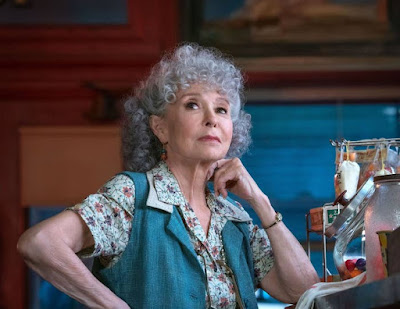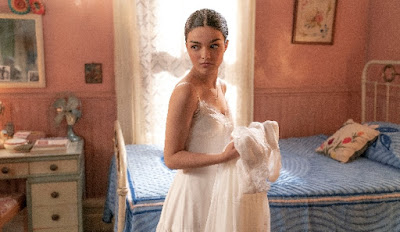GANGS OF NEW YORK (WEST SIDE STORY)
It seems ridiculous to argue that Steven Spielberg has anything to prove in his career.
He is without a doubt the world's most famous director and has been for about 47 years.
Like Hitchcock, Kurosawa, Scorsese, Ford, Truffau and Bergman, Spielberg's surname is enough to conjure movie memories.
He's the most successful director of all time, generating over $10.6 billion in box office takings - still a good $4 billion ahead of his nearest rivals, Joe and Anthony Russo.
And unlike the Russos, Michael Bay or James Cameron, he's done that by being extremely versatile and artistically daring.
Yet here he is taking on a sacred Broadway and Hollywood text - the beloved musical 'West Side Story'.
And he has done that, knowing that it will be measured against the phenomenally successful 1961 movie.
One of the joys of following Spielberg's career, though, has been his unpredictability.
Spielberg may have delivered the concept of the summer blockbuster in 1975 with 'Jaws' in 1975 but he'a also built an impressive portfolio of films spanning a variety of genres.
One minute he is polishing off a massive blockbuster like 'Jurassic Park,' the next he's winning Oscars by the shed load by poignantly tackling the Nazi Holocaust with 'Schindler's List'.
Over the years, he has given us effects driven sci-fi adventures, coming of age dramas, romcoms, war movies, action comedies, children's tales, political thrillers, biopics and spy films.
So why not tackle a musical?
Despite his accomplishments, though, some industry observers were surprised when he announced plans for a second movie of Jerome Robbins, Leonard Bernstein and Stephen Sondheim's 'West Side Story'.
Robbins and Robert Wise's 1961 movie with Natalie Wood, Richard Beymer, Russ Tamblyn, George Chakiris and Rita Moreno is regarded as a Hollywood classic.
The film won a staggering 10 of the 11 Academy Awards it was nominated for, including Best Picture.
It also regularly features at or near the summit of most lists of the greatest movie musicals of all time and it's rarely off our television screens.
Why bother remaking it?
Well, maybe because we need to stop treating certain movies like sacred texts.
No-one objects when filmmakers periodically remake 'A Star Is Born' or 'Little Women' with a new spin.
So why should 'West Side Story' be any different?
And who could seriously claim they were not intrigued by the prospect of a Hollywood legend like Spielberg taking on 'West Side Story'?
To reimagine Robbins, Bernstein and Sondheim's musical, the director has turned to an old collaborator, the Tony Award winning playwright Tony Kushner who wrote the screenplays for his movies 'Munich' and 'Lincoln'.
The duo have made a number of significant changes to the 1961 film.
Whereas both films create streets on studio backlots, Spielberg and Kushner gives their New York story a greater sense of a city at war with itself.
The opening shot of a building site for the Lincoln Center, in what was previously the Puerto Rican dominated district of San Juan Hill, resembles the bombed out towns of 'Saving Private Ryan'.
The sense of racial conflict is also more pronounced in Spielberg and Kushner's version, with the Jets provocatively daubing paint on a mural of the Puerto Rican flag in an act that sparks a brawl with the Sharks.
In the 2021 version we learn that Ansel Elgort's Tony has served time in prison for assaulting and almost killing a rival gang member which gives his reluctance to be drawn back into that world a greater sense of desperation.
In Wise and Robbins' film, Richard Beymer's Tony doesn't have as dark a back story and just seems to have just outgrown gang life.
The other big innovation is having more Latino actors in the Puerto Rican roles, with bursts of unsubtitled dialogue in Spanish.
In a nice nod to the 1961 original, 90 year old Rita Moreno, who won an Oscar for playing Anita in the original film, features in Spielberg's version.
Her drugstore owner Valentina replaces Ned Glass's Doc in the 1961 film, who we are told her character married but died years earlier.
Kushner has made other subtle tweaks but the basic essentials of 'West Side Story' are all there.
Spielberg's film begins with a confrontation between the Caucasian Jets and the Puerto Rican Sharks which is broken up by Corey Stoll's Lieutenant Schrank and Brian d'Arcy James' Officer Krupke.
The Sharks led by David Alvarez's Bernardo and the Jets led by Mike Faist's Riff are on a constant war footing throughout the film.
While they spar, Tony tries to forge a life away from violence.
On parole and working in Valentina's drugstore, he is desperate to hold onto his job and eke out a living that will keep him away from prison.
Riff, though, is keen to get Tony involved in a rumble he is arranging with the Sharks but when tries to persuade Tony to rejoin the Jets, he is rebuffed.
Meanwhile Bernardo is living with his partner, Ariana DeBose's Anita and his sister Rachel Zegler's Maria.
Josh Andres Rivera's bookish Chino, who Bernardo is keen to keep away from the Sharks, prepares to take Maria to a dance which both gangs and their girlfriends will frequent.
But while she goes along with him, she isn't interested in having a relationship with him.
When Tony turns up at the dance, he and Maria immediately fall for each other, much to the disappointment of Chino and much to the displeasure of Bernardo.
Furious that Tony is wooing his sister, Bernardo threatens him and tells Riff that the rumble he craves will go ahead only if Tony attends.
Smitten by Maria, Tony takes a risk by heading to her house and climbs the fire escape to profess his love for her.
The star crossed lovers arrange to meet up the following day and go on a clandestine visit to Upper Manhattan.
Aware that a rumble is being planned between the rival gangs, the police try to squeeze the Jets for information about when it might occur but to no avail.
Meanwhile while visiting the Cloisters in Washington Heights, Tony reveals to Maria he spent time in prison for almost beating a member of a rival gang to death.
Convinced that this experience has turned him off violence for good, Maria implores him to do what he can to get the Sharks and Jets to call off their rumble.
But with Bernardo baying for Tony's blood, does he stand a chance of succeeding?
Spielberg wouldn't be the first name that comes to mind as a director of a musical like 'West Side Story'.
However he has long harboured that dream, recalling how his mum adored the original Broadway cast recording of the show
He also previously hinted that he might have a flair for staging musical set pieces, directing his future wife Kate Capshaw in a breathtaking Busby Berkeley style opening to 'Indiana Jones and the Temple of Doom,' as she sang Cole Porter's 'Anything Goes' in Mandarin.
Working with choreographer Justin Peck and the Polish cinematographer Janusz Kaminski, Spielberg comfortably handles 'West Side Story's many set pieces.
The partnership with Kaminski is particularly fruitful, with the cinematographer and his director making great use of Steadicams, cable cams and low angle shots.
Paul Tazewell's costumes are suitably vibrant, while Adam Stockhausen's production design and Rena De Angelo's set decoration superbly captures the sense of a city not only riven with racial conflict but imprisoned by it - a theme that Spielberg and Kaminski really hammer home in the final shots of the movie.
Measured against Wise and Robbins' film, this version of 'West Side Story' holds up pretty well, even if it doesn't quite manage to eclipse the 1961 film
Some performances are actually better than those in the original.
Zegler is a find as Maria, more than justifying her open casting with a vivacious debut performance and more than holding her own against Natalie Wood's iconic performance.
Elgort has drawn a lot of criticism in some quarters for his depiction of Tony.
And while his singing is overshadowed by other members of the cast, he has a certain charisma and is no better nor worse than Richard Beymer.
DeBose, who is the runaway favourite for Best Supporting Actress at this year's Oscars, is good value as Anita, relishing her chance to belt out Bernstein and Sondheim's showstopping tune 'America' - even if she doesn't quite manage to top Moreno's Academy Award winning turn in the original.
Alvarez and Faist acquit themselves well in their respective roles as Bernardo and Riff but don't manage to supplant Chakirus or Tamblyn.
Rivera us eye catching as Chino, using his bookishness to imbue his descent into violence with a greater sense of tragedy.
With the part of Lieutenant Schrank beefed up by Kushner, Stoll gives him a 21st Century twist to him in a film still set in the era of JFK - accentuating his natural bias towards the Jets in a clever nod to institutional racism.
d'Arcy James is what you'd want as Officer Krupke but the performance that arguably steals the show is Moreno's.
Not only does she deliver a touching performance of 'Somewhere' but she consistently upstages the younger cast as Valentina - particularly in the sequence where she berates the Jets for their harassment of Anita.
And that makes Moreno's exclusion from the final Supporting Actress shortlist as baffling as Caitriona Balfe's snub for 'Belfast'.
The other yardstick by which Spielberg's version will be judged is his how he stages 'West Side Story's insane amount of showstopping tunes.
In this regard, the movie is a bit of a mixed bag.
It begins strongly enough amid the rubble of the Lincoln Center's construction site during Bernstein's 'Prologue' and its undoubted highlight is DeBose and Alvarez's spectacular street version of 'America' which is far more imaginative than the 1961 version.
The decision to give Moreno 'Somewhere' is also both poignant and astute and there are some clever visual flourishes during Elgort's take on 'Something's Coming' including the nice use of a floor reflection.
Zegler's version of 'I Feel Pretty' is appropriately skittish and the various versions of 'Tonight' are also intelligently staged, with Faust, Alvarez, DeBose, Elgort and Zegler all playing their part.
Elgort's rendition of 'Maria,' however, feels flatter than Beymer's performance in the original.
And while Spielberg imaginatively relocates the Jets' comic song 'Officer Krupke' to the police station, Faist and his crew somehow manage to lose the sense of fun that Tamblyn and his gang brought to it.
On course to make around $100 million worldwide, a lot has been made of the fact that Spielberg's movie needs to make $300 million to break even - which amounts to three times its budget.
This has been used as a bit of a stick to beat Spielberg's version of 'West Side Story' with.
However given that it was always going to be less of a draw for a younger audiences than 'Spiderman: No Way Home' which was released at the same time and given that older audiences were also going to be a bit more nervous about going to cinemas while the Omricon COVID variant raged, it is not really surprising that it hasn't quite matched those box office expectations.
What the box office doesn't take away, though, is the fact that Spielberg makes a great fist at reimagining a beloved musical and a compelling argument for other talented filmmakers being allowed to do the same.
In a society where one political party has sought to profit electorally from a huge chunk of anti-immigrant sentiment and from boneheaded demands to build a wall at the border with Mexico, Spielberg's depiction of racism in 'West Side Story' is depressingly relevant.
And maybe that's another reason why audiences haven't rushed to cinemas to see it, craving the escapism that the Marvel and DC Comics superhero movies bring in a world plagued by war, disease and combative politics.
In an industry that mostly values profit, the disappointing box office for Spielberg's film as well as Lin Manuel Miranda's 'In the Heights,' and the toe curlingly awful 'Dear Evan Hansen,' may make producers more inclined to turn to streaming services as a refuge for musicals.
That would be a huge shame because musicals belong on the big screen.
And musicals like this version of 'West Side Story' deserve that arena.
Steven Spielberg should forget the begrudgers, though.
With this imaginative version of a classic musical, he deserves his curtain call.
('West Side Story' opened in UK and Irish cinemas on December 10, 2021)




















Comments
Post a Comment